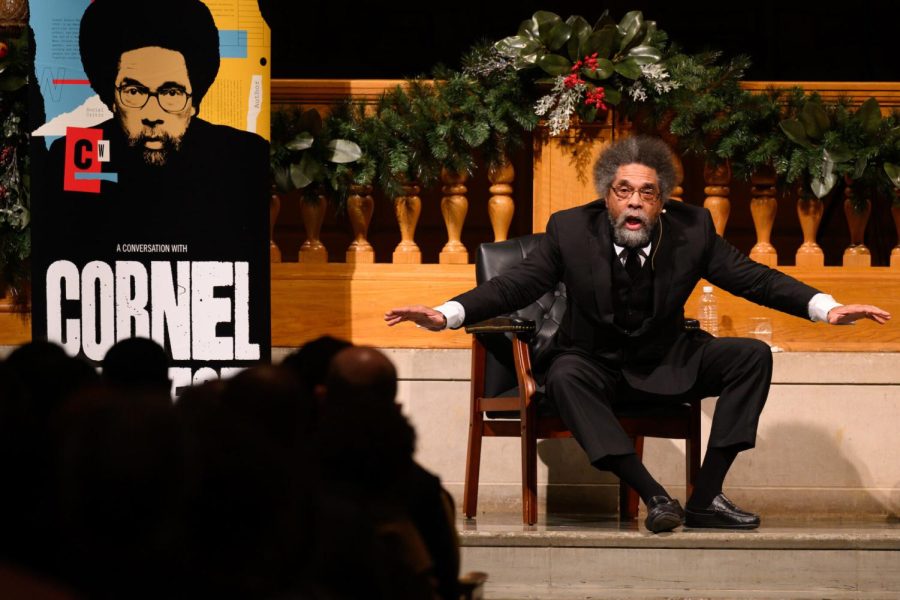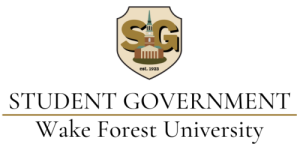Cornel West returns to campus
The acclaimed author participated in a moderated discussion on leadership and character
Courtesy of the Program for Leadership and Character
Cornel West participates in a moderated discussion about leadership and character in Wait Chapel.
December 8, 2022
Renowned scholar and public intellectual Dr. Cornel West returned to Wake Forest to discuss leadership and character in Wait Chapel on Dec. 1.
The discussion, moderated by humanities professor and Executive Director of Wake Forest’s Program for Leadership and Character, Michael Lamb kicked off “Educating Character Across the University”, a conference for educators and administrators from colleges and universities worldwide.
“Leadership and character were understood by a few that would be as engaging and as appropriate as this evening’s guest — Dr. Cornel West, ” Dr. Jonathan Lee Walton, Dean of the School of Divinity, said when introducing West. “His work bears witness to and challenges those of us who might be blinded by protestant privilege.”
West is the Dietrich Bonhoeffer Chair at Union Theological Seminary, where he teaches a wide range of subjects such as philosophy of religion, African American critical thought, classics, politics, cultural theory, music and more. A prolific writer and a progressive thinker, West has written 20 books and edited 13. Among the most well-known ones are “Race Matters”, “Democracy Matters” and “Brother West: Living and Loving Out Loud”.
West also spoke at Wake Forest on Nov 11, 2021, when he delivered a public lecture on the intersection of Christianity and social justice. This time, he began his speech by drawing on his personal experience to tell that, despite differences in places of origin, faith and socioeconomic status, universal, unconditional love can connect people.
“Each and every one of us became who we are because somebody loved us, somebody cared for us, somebody shaped us and molded us across a variety of different lives,” West said at the event on Dec. 1. “That’s revolutionary piety — being in contact with the things that are sources of good for you that lead you to be in the world.”
Caela Flake, a first-year Ph.D. student in physics, echoed West’s appeal. The reverend at her high school used to use quotes from West’s book when preaching, and when Flake came to listen to West in person, she found it exactly like how she imagined.
“The concrete love he talks about really affirms what I had been taught before,” Flake said. “There is no way to say that you love someone without having occasionally involuntary, impulsive reactions.”
West also said that the concept of leadership has been bastardized over the last 50 years, making it equivalent to superficial popularity and fearlessness. He argued that, instead, leadership should be a commitment to public good and life.
“These days, there is too much opportunism and obsession with the manipulation of the press, as well as polarization,” West said. “What do we pass on to the younger generation in terms of the great examples of character?”
The only solution, West pointed out, is to “find your voice”. Not from the abstract labels and categories, but from building friendships and learning from the difference between one another.
“I don’t think there is a formula or general theory here,” West said. “It is just a way of learning how to open yourself, be vulnerable, pour yourself into others and allow them to pour into you to revel in their humanity.”
Students from the School of Divinity, like Amorah Brown, found West’s points reflect what they learned in their religious education.
“It doesn’t matter if you are Black, brown or white, we all keep moving as brothers,” Brown said.
By the end of the keynote, West expanded his argument to the root of the unstable American society today, which is the “incapability to love”.
“The danger of American democracy is its individualism and its addiction to conformity that is grounded in a deep, lonely sense of isolation,” West said. “This is why Americans are so restless in the midst of prosperity.”
West said that the willingness to wrestle with the dark side of the American experiment — from racial prejudice to lacking upstanding moral character — is a starting point for transforming supremacy.
“No white person is born woke, just like no black person is born to hope someone would work out the issue [of racial injustice],” West said. “You gotta fight for it, undergo change, transformation and education in order to reach it.”
Rovin Jackson, a Winston-Salem resident, was inspired by West’s message.
“It is so powerful when he speaks to what’s going on right now and to the past,” Jackson said. “If we don’t work together, we will perish together. That is very important for all people to know that we can’t keep tearing each other down, expecting progress.”














